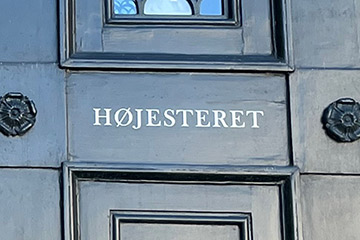Electricity meter functionality is the consumer's responsibility
12 January 2016
The Danish Eastern High Court established in a judgment of 6 January 2016 that if there is any doubt about an electricity meter reading consumers have to prove that the electricity meter is defective and does not show the actual consumption. The judgment ruled in favour of SEAS NVE as it was established that the electricity meter was not defective.
The reason for the legal action was that in the period from 2008 to 2011 SEAS NVE took down 390,000 electricity meters in Zealand when it switched over to electricity meters that can be read remotely.
In that connection SEAS NVE discovered that there was a difference of about 110,000 kWh between the electricity meter reading when it was taken down on 14 April 2011 and the consumption that the consumer had reported on 30 November 2010.
The consumer claimed that the electricity meter was defective as it did not show the actual electricity consumption; that the meter must have "run wild".
The electricity meter was examined three times at accredited labs in connection with the case and the labs could not find any defects in the meter as the counter worked perfectly and as the meter did not show any signs of having been subjected to lightning strikes or any other kinds of physical impact.
The expert confirmed during the case that the meter did not suffer from any periodical errors either as the meter group to which the specific electricity meter belonged had been made subject to the compulsory random measurement samples that are to be carried out every four years.
According to the expert, periodical errors could not have made the meter "run wild" but would have made it stop working or run slower.
SEAS NVE had checked the meter in 2001 and once again in 2011. In the intervening years the electricity consumption was charged based on the reports by the consumer or estimates made by SEAS NVE.
Based on the examinations made at the accredited labs and the expert's supplementary answers, the High Court found that it had been proved that the meter reading indicated the actual consumption at the property and the difference discovered between the reported consumption and the meter reading was consumption at the property that had not been reported in the period from 2001 to 2011.
The case featured in a Danish consumer television programme and it is expected that it will affect the practice by Ankenævnet på Energiområdet (the Danish appeals board in the energy area) and therefore also the rules on the burden of proof in cases about other types of supply meters.
Attorney Søren Vagner Nielsen conducted the case before the High Court on behalf of SEAS NVE.
In that connection SEAS NVE discovered that there was a difference of about 110,000 kWh between the electricity meter reading when it was taken down on 14 April 2011 and the consumption that the consumer had reported on 30 November 2010.
The consumer claimed that the electricity meter was defective as it did not show the actual electricity consumption; that the meter must have "run wild".
The electricity meter was examined three times at accredited labs in connection with the case and the labs could not find any defects in the meter as the counter worked perfectly and as the meter did not show any signs of having been subjected to lightning strikes or any other kinds of physical impact.
The expert confirmed during the case that the meter did not suffer from any periodical errors either as the meter group to which the specific electricity meter belonged had been made subject to the compulsory random measurement samples that are to be carried out every four years.
According to the expert, periodical errors could not have made the meter "run wild" but would have made it stop working or run slower.
SEAS NVE had checked the meter in 2001 and once again in 2011. In the intervening years the electricity consumption was charged based on the reports by the consumer or estimates made by SEAS NVE.
Based on the examinations made at the accredited labs and the expert's supplementary answers, the High Court found that it had been proved that the meter reading indicated the actual consumption at the property and the difference discovered between the reported consumption and the meter reading was consumption at the property that had not been reported in the period from 2001 to 2011.
The case featured in a Danish consumer television programme and it is expected that it will affect the practice by Ankenævnet på Energiområdet (the Danish appeals board in the energy area) and therefore also the rules on the burden of proof in cases about other types of supply meters.
Attorney Søren Vagner Nielsen conducted the case before the High Court on behalf of SEAS NVE.







